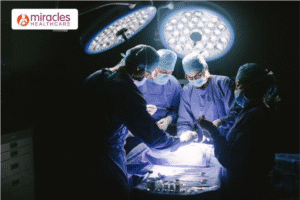
Gallstones, medically known as cholelithiasis, are small, hardened deposits that form inside the gallbladder. While they are fairly common and often remain symptomless, many individuals may not even realize they have them. However, medical experts caution that leaving gallstones untreated for too long can result in serious complications, including the rare but life-threatening condition known as gallbladder cancer.
At Miracles Apollo Cradle/Spectra, one of the top hospitals for surgery in Gurgaon, doctors are helping people understand this important connection. Dr. Anubhav Sangwan, a senior general surgeon in Gurgaon, says that knowing the risks early and receiving the right treatment on time can prevent significant problems in the future.
What Are Gallstones?
Gallstones are solid particles that form in the gallbladder when digestive fluids, primarily cholesterol or bilirubin, harden over time. The gallbladder is a small organ located just under the liver, responsible for storing bile that helps digest fats.
Gallbladder stones can range in size from as small as a grain of sand to as large as a golf ball, and may occur as a single stone or in multiples. In many cases, individuals are unaware they have them until symptoms appear or imaging tests are done for another reason.
Can Gallstones Cause Cancer?
Dr. Anubhav Sangwan explains, “Gallstones don’t directly cause cancer, but when they result in chronic, long-term inflammation, they can damage the gallbladder lining over time. This persistent irritation can eventually lead to cellular changes and increase the risk of cancer.”
Studies indicate that 70 to 90% of patients diagnosed with gallbladder cancer have a prior history of gallstones. While this does not confirm causation, it suggests a strong correlation, particularly in cases where the stones remain untreated for years.
Are Gallstones Dangerous?
In many cases, gallstones are harmless and may not cause any symptoms. However, when they block the bile ducts or cause repeated inflammation, they can lead to serious complications such as:
- Gallbladder infection (cholecystitis)
- Pancreatitis
- Biliary obstruction
- Jaundice
And in rare but significant cases, gallbladder cancer. Although gallbladder cancer is relatively uncommon, it tends to be highly aggressive and often goes undetected until its later stages.
Who Is at Higher Risk?
Some individuals have a higher risk of developing complications from gallstones, including the potential for gallbladder cancer. High-risk groups include:
- Adults over the age of 60
- Females (due to hormonal factors)
- Individuals with multiple or large gallstones, particularly those larger than 3 cm, are at a greater risk of developing complications, including gallbladder cancer.
- Patients with a porcelain gallbladder (a condition where the gallbladder wall becomes calcified)
- Those with a family history of gallbladder disease
- Individuals with obesity, high cholesterol, or a sedentary lifestyle
- People who delay or avoid surgery despite chronic symptoms
Dr. Sangwan adds, “In high-risk patients, we recommend a more proactive approach. Early intervention can prevent not just infections and hospitalizations but also reduce the long-term risk of malignancy.”
What Are the Symptoms of Gallbladder Problems?
Gallstones are usually silent, but when symptoms do appear, they may include:
- Pain in the upper right abdomen
- Pain under the right shoulder blade
- Nausea or vomiting after meals
- Indigestion, gas, or bloating
- Fever or chills (sign of infection)
- Jaundice (yellowing of skin or eyes, indicating possible bile duct blockage)
- Unexplained weight loss or appetite changes
If you or a loved one experiences any of these symptoms, especially if they occur repeatedly, it is essential to consult a gastroenterologist in gurgaon for a medical evaluation as soon as possible.
How Is Gallbladder Cancer Diagnosed?
Gallbladder cancer is challenging to detect in its early stages because symptoms mimic benign conditions like gallstones or indigestion. However, when suspected, doctors may recommend:
- Ultrasound or abdominal CT scan
- MRI or MRCP for bile duct visualization
- Endoscopic procedures
- Blood tests, including liver function tests
- Biopsy if a mass is seen
What is the Treatment for Gallstones and Gallbladder Cancer?
The most common and effective treatment for problematic gallstones is gallbladder removal surgery, known as cholecystectomy. This is often done laparoscopically (minimally invasive surgery), which means smaller cuts, less pain, and faster recovery. Dr. Anubhav Sangwan and his team at Miracles Apollo Cradle/Spectra, Gurgaon, perform hundreds of these procedures every year with excellent outcomes.
For gallbladder cancer, the treatment plan is based on how advanced the cancer is. If detected early, surgery to remove the gallbladder and surrounding tissue may be possible. In some cases, additional treatments like chemotherapy or radiation might be recommended. That’s why early detection is important; it can mean the difference between a curable condition and one that’s much harder to treat.
Should You Be Worried If You Have Gallstones?
Not necessarily. Dr. Anubhav explains, “Having gallbladder stones doesn’t mean you will develop cancer. However, the real risk comes from ignoring symptoms, delaying treatment, or skipping regular checkups, especially if you fall into a high-risk category.”
If your gallstones are silent and not causing trouble, your doctor may simply suggest monitoring them. But if you are experiencing pain or discomfort or have other risk factors, it is important to speak to a general surgeon near you and understand your options.
Prevention Tips
While not all cases of gallstones are preventable, certain lifestyle changes can reduce your risk:
- Maintain a healthy weight: avoid crash diets
- Eat a balanced diet rich in fiber, fruits, and vegetables
- Limit fatty and fried foods
- Stay physically active
- Make regular health checkups a priority, especially if you have a family history of gallbladder disease or related conditions.
When to See a Doctor?
If you are experiencing any of the symptoms mentioned, even if they come and go, it’s better to be safe and get checked. And if you are over 60, have had gallstone issues for years, or fall into a high-risk group, don’t wait for symptoms to become severe.
Why Choose Miracles Healthcare?
With over two decades of excellence in Gurgaon’s healthcare landscape, Miracles Healthcare has earned its reputation as a leading multi-specialty surgical hospital. Here is what sets it apart:
- Expert general surgeons with extensive experience in minimally invasive procedures for faster recovery and less complications.
- State-of-the-art operation theatres equipped with the latest technology
- In-house diagnostics, including USG, CT, MRI and lab services for accurate pre-surgical planning
- Personalized care plans are designed around each patient’s needs
Dr. Sangwan concludes, “Our goal is to treat the problem before it is too late. Whether you are suffering from silent gallstones or ongoing pain, getting evaluated early can protect you from a much bigger risk down the road.”
Conclusion
Gallstones may seem harmless at first, but if left untreated, they can lead to serious complications, including, in rare cases, gallbladder cancer. With timely diagnosis and proper medical care, these risks can often be managed effectively. If you are experiencing symptoms or have been diagnosed with gallstones, don’t delay care. Book a consultation with a trusted general surgeon near you and take the first step toward better health and peace of mind.







